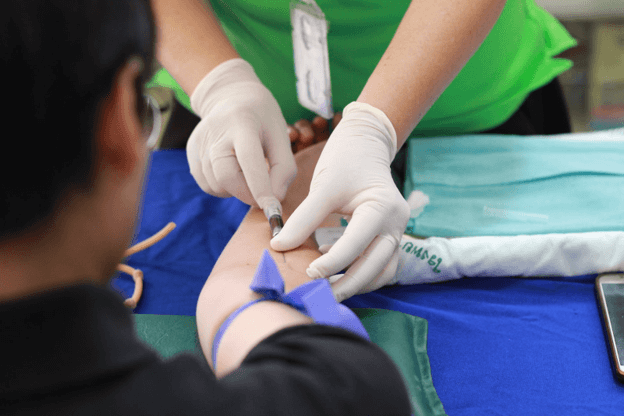Become Successful as a Medical Assistant – Here's How
Healthcare is one of the biggest industries worldwide, and so it is not surprising that becoming a medical assistant (MA) is one of the fastest growing occupations. According to the Bureau of Labor Statistics, the number of MA jobs is expected to increase to 24% through 2024.
An MA is a crucial pillar in healthcare and needed in all sorts of medical care environments, be they hospitals, private clinics, or other healthcare offices. An estimate from The Bureau of Labor Statistics claims that 59% of all healthcare personnel work in hospitals, while 15% work in private clinics, 9% work in outpatient care centers, and 4% find employment in chiropractic services.

Medical technology and knowledge are always advancing, and longevity has increased, especially in the baby boomers generation, so the need for MAs is always on the rise, which makes it a stable type of employment and a very rewarding one, not just monetarily, but rewarding in the fact that you would be meeting new people nearly every day throughout your career, and helping and comforting them with their medical issues.
What does an MA do?
An MA is someone who helps doctors, typically in offices and healthcare clinics, and perform administrative and clinical tasks. This means you would be involved with the medical as well as the administrative side of healthcare.
Medical responsibilities
On the medical side, you would be expected to know how to take patients’ vital signs, record patient health histories and any other relevant information of the patient. Assistants may also administer injections and prepare blood or other samples for testing. They can do basic lab tests, sterilize medical equipment, and detect and dispose of medical supplies that have been contaminated, among other tasks. Here, we must differentiate between being a medical assistant as opposed to being a physician assistant, which many people confuse as being one and the same thing. A physician assistance has the skills to be able to diagnose and treat a patient under the watchful supervision of a doctor. MAs are more limited in the range of what they are allowed to do, where their medical attention is based on more limited and basic clinical tasks.

Administrative responsibilities
On the administrative side, an MA has a lot of responsibility which could be greeting patients, recording patient information, filling out health insurance forms, scheduling appointments, prepare patients and schedule them for examinations and appointments, do follow ups, and bookkeeping, among other duties.
Given that there are two sides to the job, you could choose to focus and hone your skills on one side more than the other. For example, a small physician’s office will probably allow you to be able to do both medical and administrative skills on equal footing if the office isn’t extremely busy. If you work in a bigger office or hospital, things will differ, and a full day or shift of work might not give you the opportunity to do both. So your day-to-day tasks will depend significantly on the type of environment you work in.
How to become an MA
It all begins by choosing the right program. Choosing the right curriculum means choosing a program that has been accredited either by the Commission on Accreditation of Allied Health Education Programs (CAAHEP) or by the Accreditation Bureau of Health Education Schools (ABHES). Accreditation means that the curriculum or school has been reviewed by an independent body and has been found to meet the minimum educational standards for high quality programs. Accreditation matters, not only because many employers want it, but because it might be required in order to eventually become certified. If you use Med Assisting: Online Medical Assistant Website search tools, you will find different organizations that offer certification for MAs, and while each state may specify which type is required, getting more than one can help improve employment opportunities. Choosing the right program will dictate what you want for the final outcome: a diploma, associate degree or certificate. Some MAs could be best served with an associate degree, which forms the groundwork for future studies and typically takes two years. Others might want to choose the diploma or certificate, which might take one year or less to get employed quicker.
The MA must meet specific work requirements in order to ensure that they can perform their job in a professional, competent and knowledgeable manner. These requirements are:
- Education: Programs, which usually come in the form of a certificate, diploma, or associate’s degree, are typically between 10 months and 2 years in length and are offered through two-year colleges, vocational-technical schools, as well as traditional campus-based or even online universities and colleges.
- Certification: National certification isn’t always a must, but most find that holding a national credential increases their career options. One of the most well known and widely-recognized certifications for MAs is the Certified Medical Assistant (CMA) which can be earned via the American Association of Medical Assistants (AAMA). To earn the CMA certification, a candidate must pass the AAMA exam after going through and completing an education program that has been accredited by either the Accrediting Bureau of Health Education Schools or the Commission on Accreditation of Allied Health Education Programs.
- State: Based on the employer's and state requirements, medical assistants are often required to undergo training to perform specific duties.
- Job: Beyond clinical and administrative duties, many employers require MAs to possess specific traits, all of which undeniably help them stand out in their profession. Employers will appreciate and take into consideration other types of skills that are important to have to be a successful MA, such as good analytical skills to better understand medical charts or coding, for example. Also being detailed oriented is helpful since it is vital in any physician’s work.
A good career always begins with a grounded education, keeping in mind that you can never learn or know too much about your chosen career and you can always strive for more expertise. A medical assistance is a noble career, and one that needs your devotion and attention. There are many rewards of working in the medical field, and it's important to do everything you can now to prepare for this career which is all about helping others.
839GYLCCC1992



Leave a Reply